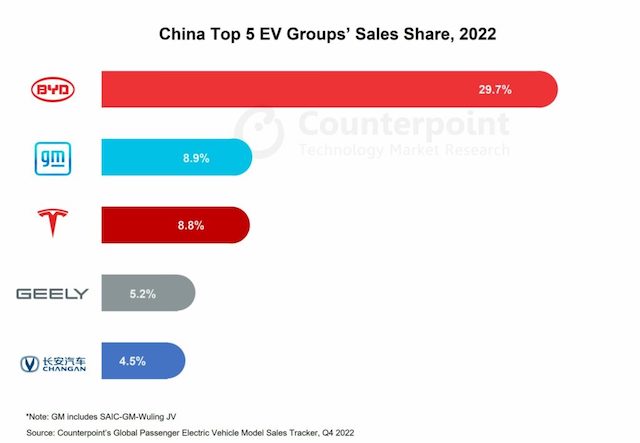China's Automotive Market: Why BMW, Porsche, And Others Face Headwinds

Table of Contents
The Rise of Domestic Chinese Automakers
The meteoric rise of domestic Chinese automakers is a primary factor contributing to the headwinds faced by international brands. These companies are no longer simply offering budget-friendly alternatives; they are aggressively competing with established players in terms of technology, brand appeal, and market share.
Technological Advancements
Chinese brands like BYD, Nio, and Xpeng are rapidly closing the technological gap. Their advancements are particularly impressive in areas like battery technology, autonomous driving features, and connected car services.
- BYD's Blade Battery technology: This innovative battery design offers improved safety and energy density, surpassing some competitors in range and charging speeds.
- Nio's Battery-as-a-Service (BaaS) model: This disruptive approach reduces the upfront cost of EVs and addresses range anxiety concerns.
- Xpeng's advanced driver-assistance systems (ADAS): Xpeng is a leader in incorporating cutting-edge ADAS features, enhancing the driving experience and attracting tech-savvy consumers.
The growth of these domestic brands is undeniable. Data from the China Association of Automobile Manufacturers (CAAM) consistently shows a dramatic increase in their market share, often at the expense of foreign luxury brands.
Brand Loyalty and National Pride
A burgeoning sense of national pride and a growing preference for domestic brands are significantly impacting sales of foreign luxury cars. Government policies promoting domestic automakers, coupled with effective marketing campaigns emphasizing national identity, have fostered this shift in consumer sentiment.
- Government subsidies and tax breaks for domestic EVs: These initiatives have made electric vehicles from Chinese manufacturers significantly more affordable and attractive.
- Targeted marketing emphasizing technological superiority and national pride: Chinese brands successfully leverage nationalistic sentiment to build strong brand loyalty.
- Consumer surveys indicating a preference for domestic brands: Studies consistently show a rising preference for locally produced vehicles among younger Chinese consumers.
Economic Slowdown and Shifting Consumer Behavior
China's recent economic slowdown and evolving consumer preferences present additional challenges for luxury carmakers. The combination of economic uncertainty and changing priorities is impacting demand for high-end vehicles.
Economic Uncertainty
The slowdown in China's GDP growth and declining consumer confidence directly affect discretionary spending, including purchases of luxury goods. Economic indicators paint a clear picture: as economic uncertainty rises, sales of premium vehicles decline.
- Correlation between GDP growth and luxury car sales: Historical data demonstrates a strong positive correlation between economic growth and sales of high-end vehicles.
- Impact of reduced consumer confidence on luxury purchases: Lower consumer confidence leads to a decrease in spending on non-essential items like luxury cars.
- Impact of inflation and rising interest rates on affordability: Increased costs and higher borrowing costs make luxury vehicles less accessible.
Changing Consumer Preferences
Younger Chinese consumers prioritize features like technology and sustainability over traditional luxury car attributes. This shift in priorities benefits more affordable brands that offer advanced technology and eco-friendly options.
- Growing demand for electric vehicles (EVs): The rapid adoption of EVs in China is reshaping the market, with domestic brands leading the charge.
- Preference for connected car features: Younger buyers are increasingly demanding advanced connectivity features, infotainment systems, and driver assistance technologies.
- Focus on sustainability and environmental concerns: Growing awareness of environmental issues is driving demand for electric and hybrid vehicles, creating a shift away from traditional gasoline-powered luxury cars.
Increased Competition and Price Pressure
The Chinese automotive market is characterized by intense competition and pricing pressures, further complicating the landscape for established international players.
Intense Market Competition
The influx of both domestic and international brands has created a fiercely competitive environment, characterized by shrinking margins and pressure to constantly innovate.
- Increased number of players: The market is saturated with both established international and rapidly emerging Chinese brands.
- Competitive pricing strategies: To maintain market share, many players are resorting to aggressive pricing strategies, impacting profit margins.
- Intense marketing campaigns: Brands are investing heavily in marketing to attract consumers in a highly competitive environment.
Import Tariffs and Regulations
Government regulations and import tariffs increase the cost of imported vehicles, making them less competitive against domestically produced alternatives.
- Impact of import tariffs on vehicle pricing: Tariffs significantly increase the final price of imported cars, making them less attractive to price-sensitive consumers.
- Stringent emission regulations: Meeting China's increasingly strict emission standards adds to the manufacturing costs for foreign automakers.
- Bureaucratic hurdles and licensing requirements: Navigating the regulatory landscape in China can be complex and time-consuming, adding costs and delays for international brands.
Conclusion
China's automotive market, while still substantial, presents significant challenges for international luxury brands like BMW and Porsche. The rise of domestic automakers, economic headwinds, and intense competition are creating a complex and increasingly difficult environment. Understanding the complexities of China's automotive market is crucial for any automaker aiming to succeed. Further research into the evolving consumer preferences and technological advancements within China's automotive market is essential for navigating the headwinds and capitalizing on future opportunities. Stay informed on the latest developments in China's automotive market to adapt your strategies effectively.

Featured Posts
-
 Derbito Go Odluchi Se Barnli I Lids Povtorno Vo Premier Ligata
May 13, 2025
Derbito Go Odluchi Se Barnli I Lids Povtorno Vo Premier Ligata
May 13, 2025 -
 Gibraltar Et Le Royaume Uni Progres Significatifs Sur L Accord Post Brexit
May 13, 2025
Gibraltar Et Le Royaume Uni Progres Significatifs Sur L Accord Post Brexit
May 13, 2025 -
 Byds 2030 Vision A Global Automotive Powerhouse
May 13, 2025
Byds 2030 Vision A Global Automotive Powerhouse
May 13, 2025 -
 Kyle Tucker Report Infuriates Cubs Fans
May 13, 2025
Kyle Tucker Report Infuriates Cubs Fans
May 13, 2025 -
 Megan Thee Stallion V Tory Lanez Deposition Sabotage Allegations Investigated
May 13, 2025
Megan Thee Stallion V Tory Lanez Deposition Sabotage Allegations Investigated
May 13, 2025
Latest Posts
-
 Walmart Recall Affecting Electric Ride On Toys And Portable Charging Devices
May 14, 2025
Walmart Recall Affecting Electric Ride On Toys And Portable Charging Devices
May 14, 2025 -
 Recall Announcement Walmarts Action On Electric Ride On Toys And Chargers
May 14, 2025
Recall Announcement Walmarts Action On Electric Ride On Toys And Chargers
May 14, 2025 -
 Consumer Alert Walmart Recalls Electric Childrens Toys And Phone Chargers
May 14, 2025
Consumer Alert Walmart Recalls Electric Childrens Toys And Phone Chargers
May 14, 2025 -
 Product Recall Walmart Removes Electric Ride On Toys And Chargers From Stores
May 14, 2025
Product Recall Walmart Removes Electric Ride On Toys And Chargers From Stores
May 14, 2025 -
 Important Safety Information Walmart Recalls Ride On Toys And Phone Chargers
May 14, 2025
Important Safety Information Walmart Recalls Ride On Toys And Phone Chargers
May 14, 2025
